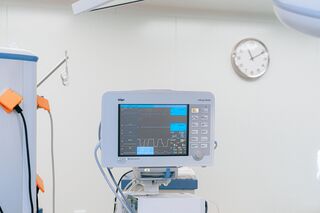Psychology
Surgery and the Psychology of Mortality
We tend to evade the topic of death, even when it becomes a possibility.
Posted November 12, 2021 Reviewed by Tyler Woods
Key points
- There is a place for positive thinking, but there is also a place for a sober reckoning of the risks of major surgery, including mortality.
- Is this practice of suppressing reminders of mortality in medical settings a useful one?
- Mortality salience makes people more intolerant of any information that conflicts with their worldview.
A little while ago, I underwent surgery. I was very fortunate: I received excellent medical care, had lots of emotional support, and the procedure went exactly as planned.

I want to discuss not the physical aspects of surgery but some of its psychological ones, some of which were surprising. Right up until the time of my surgery, my feelings about it were ambivalent.
On the one hand, I recognized that the surgery was the best thing to do, that it was supported by published studies and by careful cost-benefit analysis. I understood the reasoning in favor of the surgery, as a layperson, reasonably well.
On the other hand, I recognized that the surgery carried a small but real risk of mortality ("perioperative mortality," in the lingo of surgeons) or serious morbidity. In consenting to surgery, I was consenting to a procedure that might lead, relatively quickly and directly, to a profoundly bad outcome. This thought led me to feel, reasonably enough, apprehensive.
I never quite managed to balance these two thoughts—that surgery would almost certainly be helpful and would extend my lifespan, on the one hand, and that it was potentially harmful on the other. I did try to seek out what guidance I could find.

By temperament, I'm inclined to seek guidance from books, and my hospital provided one: Prepare for Surgery, Heal Faster by Peggy Huddleston. This book was in many ways helpful, with a heavy dose of positive thinking. For instance, it recommended visualizing a successful post-surgical outcome. I did that, and it happily came to be in reality more or less exactly as I visualized it.
Other suggestions I did not follow. The book suggested, for example, that I write a list of "healing statements" and ask my anaesthesiologist to repeat these during surgery. I wasn't really convinced that this would make any difference, and I couldn't quite bring myself to write up such a list in any case.
Overall, I found the guidance offered by this book—and much of the other literature on preparing for surgery that I found—somehow incomplete. There is a place for positive thinking, but there is also a place for a sober reckoning of the risks of major surgery, mortality foremost among them. I received a clear articulation of these risks from my surgeon and other medical staff, but I found them generally absent from the psychological guidance given to surgery patients.
In a way, this is odd. Hospitals are no strangers to the language of death. It is not for nothing that the case review talk in an academic medical center is traditionally known as a "Morbidity and Mortality" conference. But this kind of language is often "internal" language, to be used among physicians and nurses but not among patients. (A notable exception here, outside the scope of this discussion, is hospice and palliative care, which tends to take a more open and affirming attitude towards the fact of our mortality.)
In short, the psychological guidance provided to surgery patients felt like it engaged in a tactful silence around the question of mortality, along with a touch of magical thinking about the effects of a positive outlook. This stood in stark contrast to the rather more frank and realistic outlook that surgeons and other providers seemed to adopt among themselves.
This led me to wonder about a question more general than my own case: Is this practice of suppressing reminders of mortality in medical settings a useful one? What are its effects, and what might an alternative look like?
There is a large and fascinating empirical literature on the question of how individuals react to being made aware of their own mortality, called "mortality salience." The effects of mortality salience have been widely studied, and have been shown to be both varied and impactful. Mortality salience has been shown, for example, to worsen the symptoms of certain forms of anxiety (such as panic disorder), to increase frugal spending behavior, and even to spend less time outdoors in the sun.
The most general and robust result of this research, however, has been a central premise of "terror management theory," that people respond to death anxiety by embracing their fundamental worldview (whatever it may be) more strongly, and that mortality salience makes people more intolerant of any information that conflicts with their worldview. In effect, mortality salience makes us more confident and more single-minded in our fundamental beliefs.
The thought that reminders of death make us more dogmatic is, for me, surprising and somewhat disappointing. If this is the effect that reminders of our death have on us, then perhaps it is for the best that they tend to be suppressed in the medical context.
There is another way of thinking about "mortality salience," however, that suggests it has a more salutary role to play. This is the tradition of memento mori ("Remember that you will die"), which has been advocated in recent years by figures as diverse as neo-Stoics and by Catholic thinkers such as Sister Theresa Aletheia Noble. According to this tradition, meditating on and assembling reminders of one's mortality is a crucial spiritual practice.
It is not clear to me which of these traditions, if either, rightly captures the impact of reflecting on one's mortality, especially in cases where mortality is a small but real probability. My own experience is of coming through this with ambivalence and a measure of confusion. Perhaps this is the best that any of us could do but, then again, perhaps this is a topic where patients could be given better guidance than I was able to find.




